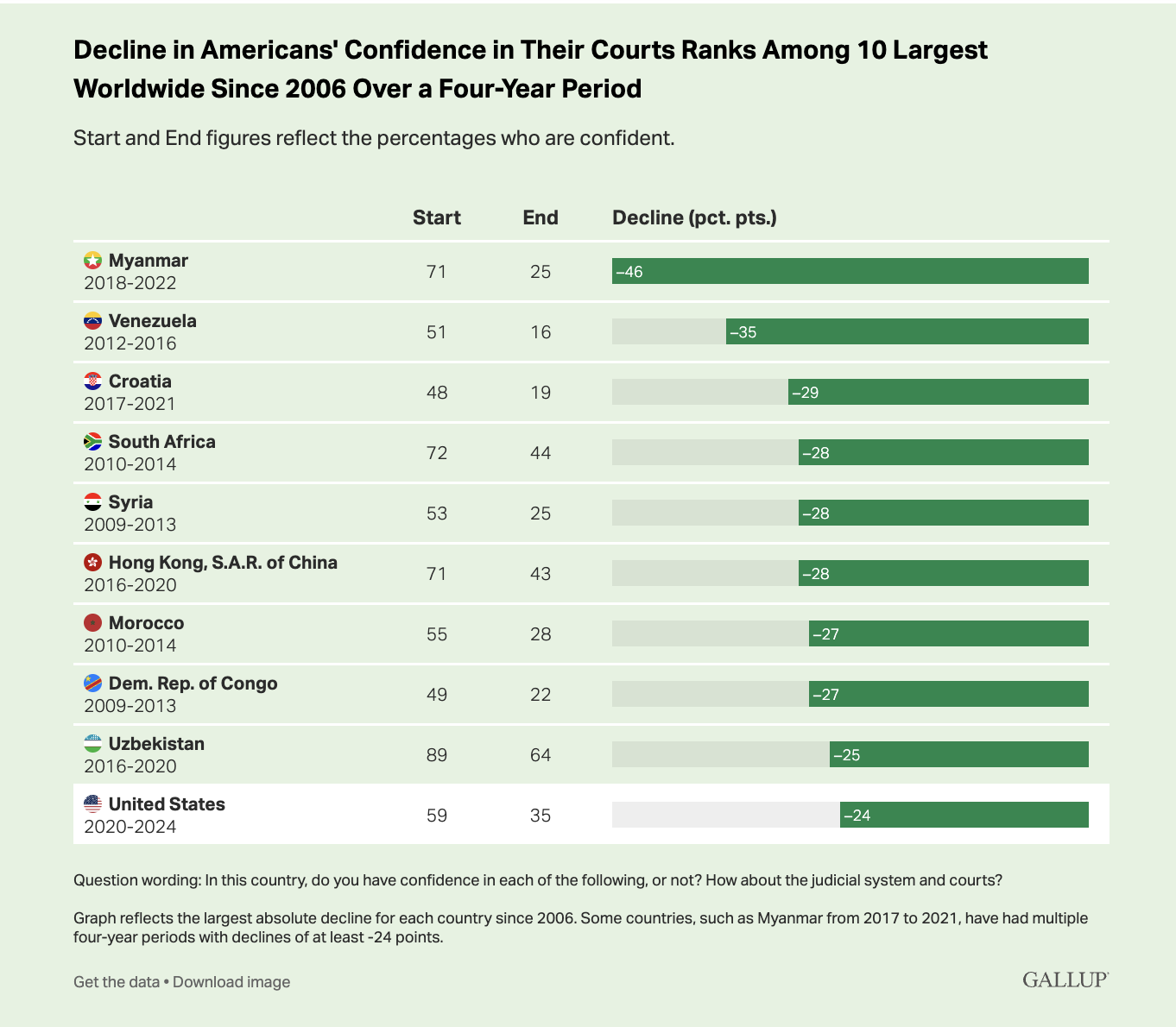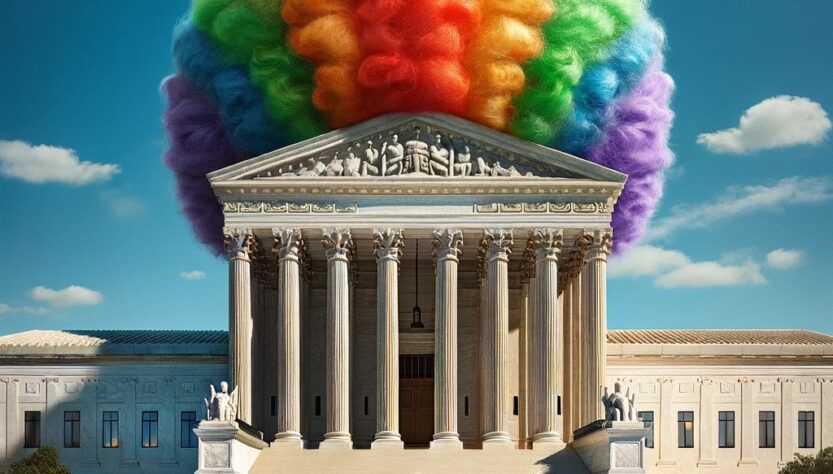
(Photo via Image Generator)
It appears that Americans have lost a lot of faith in American courts. A LOT of faith.
Who would’ve thought tossing a half century of abortion precedent and rewriting the Constitution based on vibes (and then publicly regretting it), while trying to hide the luxury trips and expensive gifts they’re taking could shake the nation’s faith in blind justice. And that’s just the Supreme Court… we haven’t even gotten to the lower courts where unqualified judges play Mad Libs with statutes and single judge courthouses overrule the FDA’s medical judgments from Amarillo.
They said “boneless” wings can have bones, for God’s sake.
And new findings from Gallup reveal that all this has triggered a loss of faith of global proportions.

Gotta love whenever the United States gets mentioned alongside Myanmar! Coincidently, a nation where the courts also believe in immunity for assassinating political rivals. That seems at least somewhat relevant.
Hong Kong’s courts are in the midst of a hostile takeover prompting Biglaw firms to abandon China outright and Syria has… gone through some stuff lately. Yet the declines in those countries leading up to recent events rank only slightly ahead of America’s loss of faith in its courts.
Rarified air. Kudos all around.
This crisis of confidence is entirely the fault of the courts. Or more specifically, the superstructure of judges, academics, and friendly media who have either engaged in or normalized the sorts of actions described above. The latter point shouldn’t be overlooked. There are voices within and without the judiciary who sit silently as this happens out of some phony sense of “civility” or “deference.” It’s a misplaced impulse because saving the credibility of the judiciary isn’t served by pretending it’s normal and appropriate for judges to be taking luxury vacations, and shame on you for questioning them!
But since taking responsibility isn’t any of these people’s style, they want to pin the blame on everyone else and they’re working harder at that than they are at basic legal research.
There’s an aggressive gaslighting campaign to make this all the fault of anyone who points out bonkers rulings and clumsy corruption. In editorials and social media posts, defenders of the rot have sought to poison the well by casting any criticism of judging as undermining the rule of law writ large. Or worse… like when Fifth Circuit Judge Edith Jones threw a recent comically unhinged temper tantrum claiming judge shopping criticism causes death threats.
Personal attacks — like the ones Judge Jones never could identify in her rant — aren’t productive. But critiquing the reasoning in written opinions (assuming they bother writing an opinion) or shining a light on jurists taking private jet trips with parties before the court or taking cases they know to be manufactured to exploit political or financial bias or noting that the ABA rates a judge as unqualified aren’t personal attacks, those are matters of valid public concern.
Whenever someone suggests that criticizing a decision amounts to an assault on the rule of law itself, it betrays the foundational corruption in the system right now. Judges seeing themselves as personally coextensive with the law is some serious Louis XIV shit. Ideally, judges seek to interpret the law and while their opinions carry the force of law, they could well be proven wrong. Yet it’s a core belief of many judges — especially those who’ve draped their personal political beliefs in the veneer of hypothetical “originalism” — that they do not interpret law but divine its immutable meaning. By this reasoning, they cannot be “wrong” because they have infallibly decreed the law and to point out lapses in logic or shoddy research is not just an attack on their work, but on law itself.
That’s dangerously authoritarian and opens the door to corruption. If they’re just objectively stating the law… then who cares if they’re taking money from one of the litigants? Or passing judgment on the whole country for a Potemkin plaintiff in their one-judge courthouse? Or going on luxury junkets to be taught what opinions to write?
It’s an actual crisis when public confidence suffers a hit like this. Judges should be figuring out how to fix it instead of railing against everyone pointing out that their judicial emperors wear no clothes.
Instead, the Chief Justice will probably write another report about the history of typewriters.
 Joe Patrice is a senior editor at Above the Law and co-host of Thinking Like A Lawyer. Feel free to email any tips, questions, or comments. Follow him on Twitter or Bluesky if you’re interested in law, politics, and a healthy dose of college sports news. Joe also serves as a Managing Director at RPN Executive Search.
Joe Patrice is a senior editor at Above the Law and co-host of Thinking Like A Lawyer. Feel free to email any tips, questions, or comments. Follow him on Twitter or Bluesky if you’re interested in law, politics, and a healthy dose of college sports news. Joe also serves as a Managing Director at RPN Executive Search.

